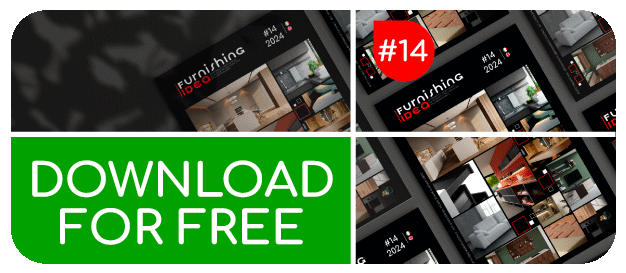
- 02/12/2024
- Companies: strategies and future
Index
Alpi was the first company to industrialise the production of decorative wood composite surfaces. It is a company of excellence that stands out for its wide range of products and its ability to meet the needs of a very diverse customer base by designing customised solutions.
Innovation, sustainability and customisation are certainly three key themes for the subcontracting sector. We explore these themes by putting a few questions to Vittorio Alpi, President of Alpi SpA.
The 2024 edition of Sicam was also a successful event and a showcase for innovation. Innovation was the key word that emerged in all sectors, which makes it possible to understand the great research work carried out by companies in the subcontracting sector to develop new psroducts and innovative processes. How does Alpi approach these issues?
Our company's approach to innovation is twofold, combining tradition and technology. On the one hand, our aim is to make the best use of all the resources at our disposal: we want to be able to upcycle wood using raw material waste, transforming it into products of the highest aesthetic quality. This approach is not only a response to sustainability needs, but also a creative challenge to reinvent the very concept of material.
In parallel, we are exploring the potential of artificial intelligence to further improve our processes. In particular, we are interested in recreating a wood that combines technical perfection and natural aesthetics, restoring the warmth and authenticity of the original material, but with the enhanced properties that modern technologies can offer. The integration of three-dimensional technologies into our production processes also represents an extraordinary opportunity to expand the range of applications for wood surfaces, allowing us to offer our customers ever more innovative solutions.
For us, innovation is never an end in itself, but a tool for preserving the beauty of wood while ensuring the sustainability and excellence that have always distinguished us.

ALPI Sunset, Design Konstantin Grcic, Ph. Federico Cedrone
Ecodesign is the thread that runs through all the departments present at Sicam. To create a sustainable product, what are the necessary elements to ensure that it really meets all the requirements to be called such?
For us, sustainability and innovation are fundamental principles that guide every aspect of our work. Making a sustainable product means taking a holistic view of its entire life cycle, from the selection of raw materials to their processing and reuse or disposal at the end of its life. This approach has led us to obtain FSC®100% certification for our forest concessions in Cameroon, which guarantees environmentally, socially and economically responsible management. Every tree felled is traceable and every process follows strict criteria to preserve biodiversity, legality and respect for local communities.
The central theme of the upcoming interzum 2025 is "Rethinking Resources: Circular and Biobased Solutions". Is Alpi ready for this change?
We are ready for the challenge of "Rethinking Resources", which will be the central theme of Interzum 2025, thanks to our continued investment in circular solutions. We are working on the development of innovative materials derived from wood processing waste, transforming them into new production possibilities without compromising aesthetic quality. In this way, we are putting the principles of the circular economy into practice, reducing waste and maximising the value of natural resources.
According to FederlegnoArredo's recent FurnCIRCLE research, 44% of companies in the sector have implemented eco-design policies and 81% plan to do so by 2027. Certification, training and circular economy are considered strategic assets for the future.
The commitment to ecodesign is also reflected in long-term strategies that include certifications, training and reforestation projects, as well as a continued focus on research and development. The circular economy and sustainability are not just an opportunity for the future, but a responsibility that every company should embrace. We fully agree with the FurnCIRCLE research data and are already aligned with these trends, aiming to exceed market expectations and contribute to a more sustainable future, without sacrificing excellence and transparency.

ALPI Wooclé, Design GamFratesi, Ph. Federico Cedrone
Customisation has been a very strong trend in recent years, not only at the Salone del Mobile in Milan, and therefore with the finished product, but also at Sicam. A product expressed through finishes, textures, colours, made-to-measure products. Alpi has a lot to teach when it comes to personalisation
Customisation is one of the fundamental pillars of Alpi's approach, combining advanced technology, design, experience and craftsmanship to offer tailor-made solutions that meet the most specific market needs. Our product range, ALPIlignum Wood Collection and ALPIlignum Designer Collection, is designed to meet unique design requirements, ranging from faithful reproductions of natural woods to completely new patterns and textures not found in nature.
Our wood is not printed, it is authentic: the grains and colours are derived from sophisticated staining and pressing processes that allow us to create custom decors that can be adapted to the customer's needs. This makes each Alpi material a fully customisable element, ideal for architects and designers looking for unique, high quality solutions.
We constantly work with our customers through personalised advice. We offer an extensive and constantly expanding catalogue and develop new custom woods that enrich our valuable Xylotheque, an archive of design inspiration and ideas. The possibilities for customisation are endless: from meeting technical specifications such as formaldehyde-free or fire-retardant properties, to creating ready-to-use pre-finished surfaces such as ALPIready, synonymous with strength and ease of application.

ALPI Xilo North Light, Design Piero Lissoni, Ph. Federico Cedrone
In the opening photo, Vittorio Alpi photographed by Veronica Gaido


 en
en  Italian
Italian French
French German
German Spanish
Spanish Portuguese
Portuguese








